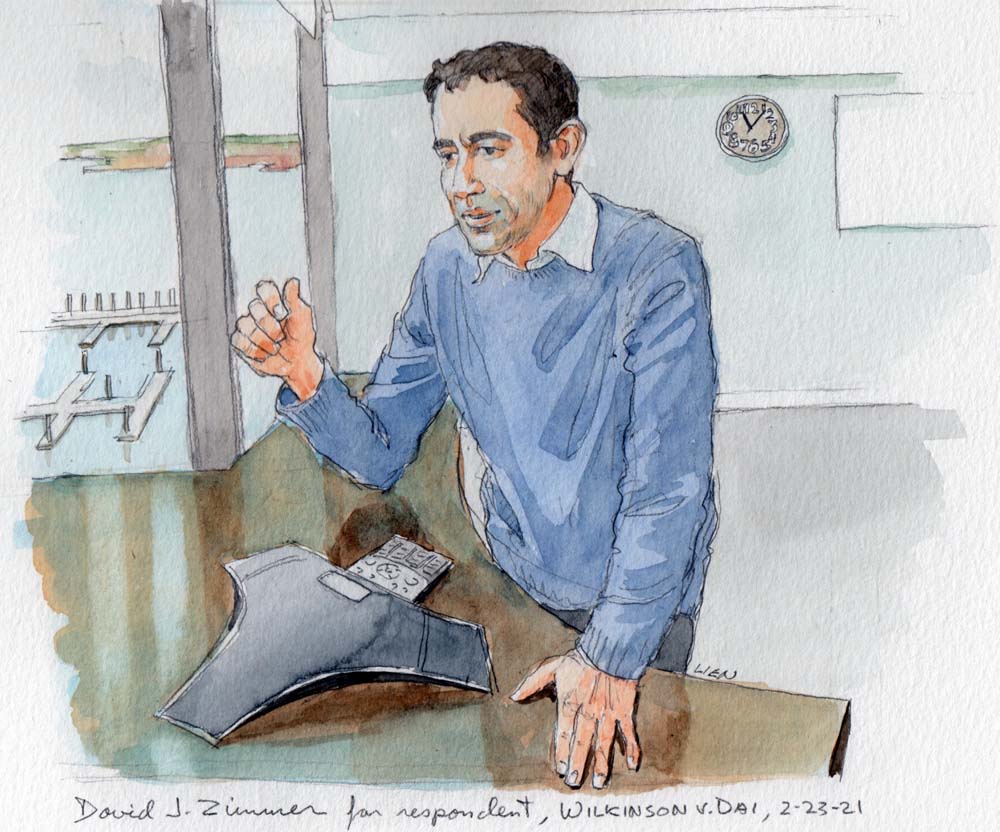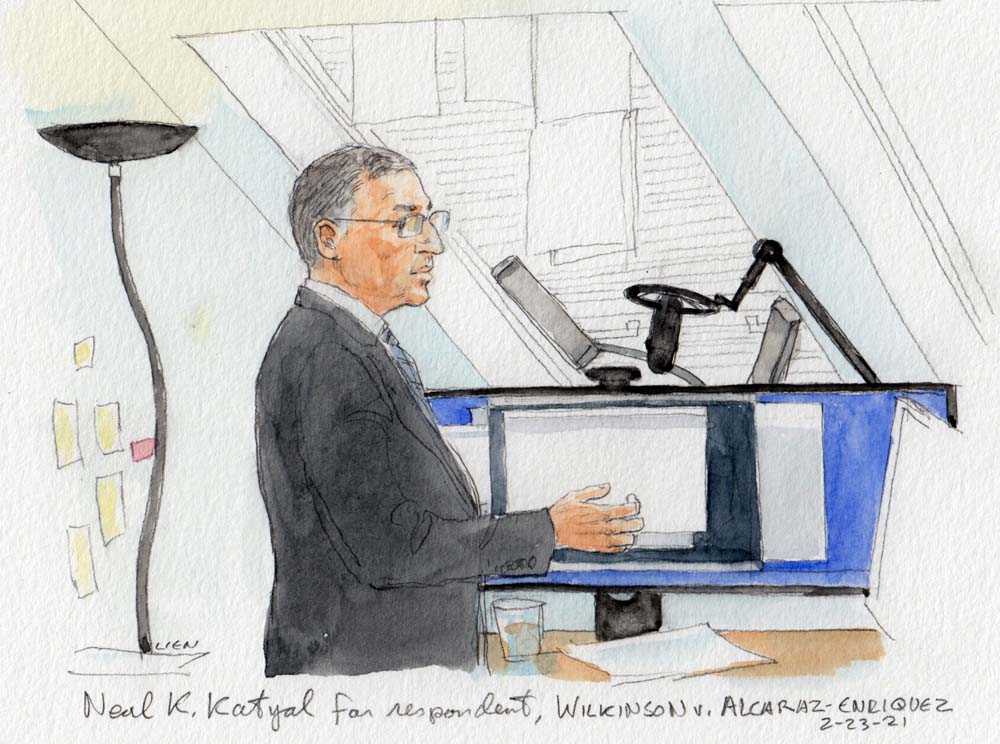Court considers credibility, persuasiveness and truth in asylum seekers’ testimony


On Tuesday, the Supreme Court considered how federal courts should view asylum seekers’ testimony in the absence of express credibility findings by the administrative agency that handles asylum claims. In a telephonic hearing on two consolidated cases, Wilkinson v. Dai and Wilkinson v. Alcaraz-Enriquez, the justices considered whether to uphold the U.S. Court of Appeals for the 9th Circuit’s approach, which treats such testimony as credible in its review of the agency’s denials of asylum.
The cases involve the claims of Ming Dai, who sought asylum from China after authorities targeted him and his wife for violating its one-child policy; and Cesar Alcaraz-Enriquez, who sought permission to remain in the United States based on a fear of persecution in his home country of Mexico. Immigration judges and the Board of Immigration Appeals denied their requests for relief but did not expressly make adverse credibility findings about either man’s testimony. On review, the 9th Circuit – applying its longstanding precedent on the treatment of asylum seekers’ testimony in light of such silence – ruled that Dai was eligible for asylum and ordered the board to reconsider Alcaraz-Enriquez’s case.
During oral argument, the justices and advocates parsed fine-grained differences between credibility, persuasiveness and truth. Their exploration delved deeply into the facts of both cases, as well as into a more light-hearted scenario involving cookie-eating children.

In his opening questions to Assistant Solicitor General Colleen Sinzdak, the chief justice pressed Sinzdak into affirming that yes, the government supports the Chenery doctrine, under which federal courts uphold agency determinations based only on reasons given by the agency. Sinzdak agreed with counsel for the asylum seekers that when it comes to an agency’s reasons for denial of asylum, “the pathway has to be clearly discerned.” But even absent an express credibility finding by the agency, there is no conflict between Chenery and the government’s position, said Sinzdak, because the government is not asking federal courts to review credibility determinations that the immigration courts never made.
According to the government, the agency deemed evidence apart from credibility to have undermined the persuasiveness of the two asylum seekers’ claims. And as 8 U.S.C. § 1158(b)(1)(B)(ii) refers to agency consideration of whether testimony is both “credible” and “persuasive,” this distinction was both permitted and critical. Sinzdak argued the 9th Circuit should have accordingly side-stepped the issue of credibility, instead reviewing the agency’s determinations on the persuasiveness (or lack thereof) of other evidence. Specifically, she posited that the court of appeals should have assessed whether “other noncredibility-related reasoning is supported by substantial evidence.”
In response to Justice Clarence Thomas’ skepticism on this distinction between persuasiveness and credibility, Sinzdak offered the following example:
My six-year-old son might be credible when he tells me he didn’t eat the cookies, but I may not ultimately find that persuasive if I find crumbs all over his room.
Thomas chuckled, and pressed back: “[I]t would seem to me that if you saw the crumbs, it would undermine credibility.”
Not so, replied Sinzdak. She could find her son credible — “capable of being believed,” perhaps because his sister could have framed him — but ultimately conclude his account “doesn’t have the power to persuade.”
Sinzdak then returned to the facts of Dai’s case. Dai fled to the United States and sought asylum after Chinese authorities forced his wife to undergo an abortion and then severely beat and detained him. He testified he feared further persecution including involuntary sterilization. But Sinzdak argued that the agency had deemed Dai’s account unpersuasive by relying on three pieces of evidence other than ultimate credibility. First, Dai’s wife and daughter returned voluntarily to China after initially accompanying him to the United States; second, Dai was not forthcoming in admitting this fact; and third, Dai told an asylum officer that the “real story” behind his trip to the United States was wanting to make a better life for his child and having no job in China.
Justice Samuel Alito responded skeptically. “[T]his distinction that you were drawing between credibility and persuasiveness … I think it’s extraordinarily confusing and invalid,” he said. Building on the cookies example:
If at the end of the day you conclude that your son really did eat the cookies, he was not credible, what he said was not worthy of belief. To say, well, he was worthy of belief, but in the end, I don’t believe him, that escapes me.
Justice Elena Kagan agreed. The three pieces of evidence Sinzdak described in Dai’s case, which “all go to whether or not [Dai is] telling the truth,” Kagan said, “join me up to Justice Alito, that if the evidence is related to whether he’s honest in his testimony, then it goes to credibility.” Justice Amy Coney Barrett piled on to make a trio: “I have to say join me up with Justices Alito and Kagan. I’m baffled by the distinction you’re drawing between credibility and persuasiveness.”
Justice Stephen Breyer, meanwhile, took issue with what Sinzdak observed is agreed upon by all parties: that credibility is also different from truth. “Well, it may be common ground on all of the parties, but it isn’t common ground with me because I would be quite worried about introducing into administrative law, with thousands of agency decisions, some kind of distinction between credible and truthful,” Breyer said. Sinzdak assured him that in this case, the distinction would be grounded in the text of the immigration statute.
True to form, Justice Neil Gorsuch also drilled down on administrative law considerations, and specifically the scope of federal court review. He wrangled a notable concession, garnering a “yes” from Sinzdak in response to the question: “[D]oesn’t [the court of appeals] have to inquire as to whether the board reasonably treated the presumption [of credibility in favor of the applicant]?”
Neal Katyal, appearing on behalf of Alcaraz-Enriquez, seized upon this answer in his opening: “The government petition for certiorari claimed courts should not enforce the presumption of credibility when reviewing board decisions, but now, as they said to Justice Gorsuch, they accept that this presumption does apply in federal court.” He questioned whether the remaining “fact-bound” issues are “cert-worthy,” but proceeded to address them in detail throughout his argument.
In response to a question by the chief justice, Katyal reaffirmed Alcaraz-Enriquez’s position that there is a distinction between truth and credibility, but downplayed the point, admitting that there are often “massive overlaps” between the two. He also assured multiple justices that he seeks “no magic words” from the agency to establish a credibility determination — just a clear enough articulation of reasons to form a record for review. This the agency did not do, he told Thomas, casting particular aspersion on the immigration judge’s decision: “[T]he IJ’s opinion is like a bad law school exam. … It lays out the facts on both sides, but it never applies them to explain how it resolved this case.” In the same exchange, Katyal also took issue with the government’s position that reviewing courts should uphold the agency on a non-explicit determination of persuasiveness, wholly apart from credibility. “[W]e don’t think that you can just implicitly rely on a persuasiveness calculation, particularly when the evidence is presumed credible.”
Katyal reminded the justices twice that “seven decades” of Chenery guide administrative law, requiring discernable reasons by the agency and federal court review limited to those reasons. Also, more than once in his argument Katyal urged the justices to train the same scrutiny on the immigration agency as they would in other administrative contexts: “[Y]ou wouldn’t accept this reasoning or lack thereof if this were the SEC or EPA. You shouldn’t accept it here.”
Third up was David Zimmer, appearing on behalf of Dai. The chief justice efficiently confirmed alignment of the respondent parties: “[D]id Mr. Katyal say anything with which you disagree?” — to which Zimmer answered, “no.” The focus then shifted quickly to whether the 9th Circuit violated the ordinary remand rule. In Dai’s case (unlike Alcaraz-Enriquez’s), the court of appeals determined asylum eligibility and granted related relief outright, rather than sending the case back to the board for redetermination.
Both the chief justice and Justice Sonia Sotomayor asked why remand wasn’t appropriate in this case. Zimmer explained that in this particular situation — involving asylum seekers’ credibility — the statutory presumption that applicants enjoy before the board “works as sort of a gap filler … in the face of administrative silence.” That is to say, the 9th Circuit rule — treating asylum seekers’ testimony as credible absent an explicit agency finding — correctly follows the statute and leaves nothing for the agency to do on credibility. Zimmer also emphasized that the government’s central contention that Dai could somehow be credible and yet have been lying “just makes no sense.”
The majority of the back-and-forth between the justices and advocates focused on granular factual and definitional issues. The justices seemed oft-unpersuaded by the distinctions between truth, persuasiveness and credibility drawn by the parties. Various hypotheticals and deep-dives into the evidence spurred somewhat unusual alliances, including a possible Thomas-Alito-Kagan-Barrett front against (in?)credible snacking children. Yet shared skepticism toward the parties’ key positions left the justices’ ultimate views on the 9th Circuit rule and the contours of federal review unclear.
Posted in Merits Cases
Cases: Garland v. Dai, Garland v. Alcaraz-Enriquez